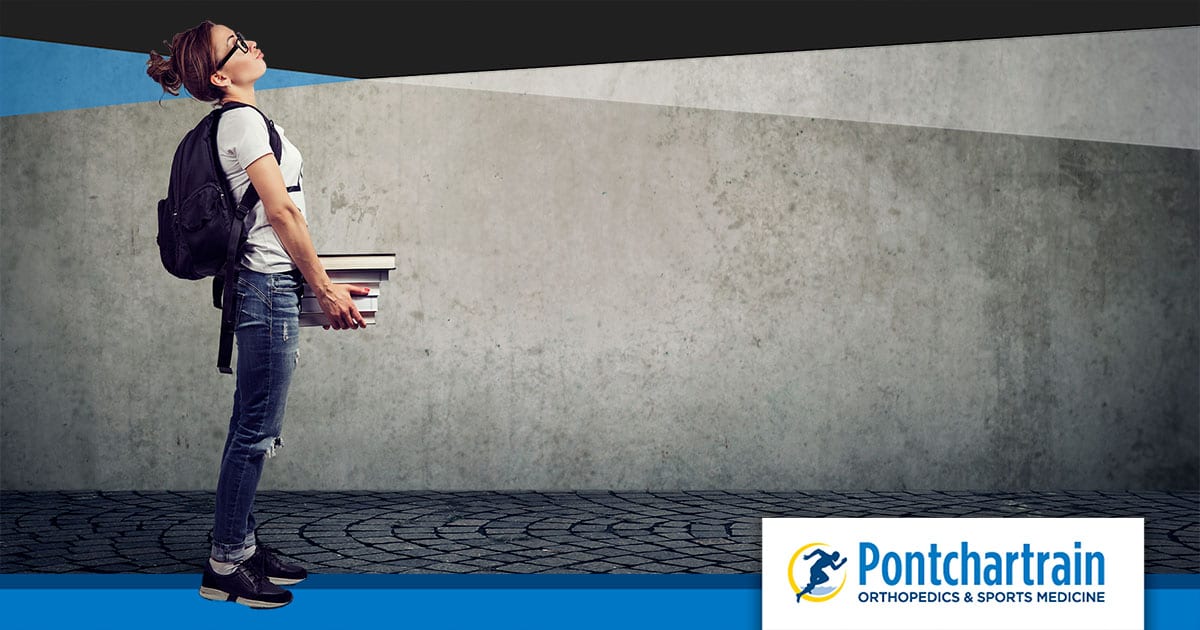BACKPACKS AND BACK PAIN

Once a convenient place to carry lunch and a trapper-keeper, school backpacks, their contents, and the backs that carry them have changed. You’ve seen them. Students of every age hunched-over, trudging to school with a monstrous pack balanced on their backs. Starting as early as second grade, many children carry heavy backpacks to and from school.
In today’s post, we will take a look at backpacks and back pain. Specifically, what’s happened to backpacks, what damage they may be causing to children’s backs, and what to do about it.
What’s happened to school backpacks?!
A quick look inside a student's backpack will reveal textbooks have gotten bigger, heavier and more numerous. Many students are required to carry all of their books to and from school, every day.
How heavy is too heavy? According to the American Academy of Pediatrics (AAP), a child’s backpack should weigh no more than 10-20 percent of his or her body weight. One sign that a backpack might be too heavy includes a change in the child’s posture when he or she wears the backpack. If they struggle when taking off or putting on the backpack, it may be too heavy. Also, red marks or tingling or numbness in the back is a sign of too much weight - and could be the early warning signs of a serious condition.
Risks of Over-Loaded School Backpacks
By design, the back will compensate for any load applied to it. However, long term use of an overloaded backpack can result in chronic back pain that children may take with them through their school years, including college.
Overloaded backpacks can:
"Carrying backpacks over one shoulder causes muscles to work harder
because of the uneven weight."
Preventative Tips: Backpacks and Back Pain
While there’s no way of getting around carrying a backpack to school, backpacks and back pain do not have to be synonymous. Parents can do a few things to make sure that the likelihood for injury is lessened. First, always wear a backpack across both shoulders. Carrying backpacks over one shoulder causes muscles to work harder because of the uneven weight. When the spine then leans in the opposite direction, the middle and lower back as well as the ribs become stressed as they compensate.
Other tips to consider:
What to do about backpacks and back pain?
Fortunately, most children will not be permanently injured by carrying a heavy backpack. However, learning proper lifting and spine care techniques will serve your child well for a lifetime.
Dr. Michael Zeringue, MD, MPH at Pontchartrain Orthopaedic and Sports Medicine says “Physical therapy is often all that is needed to correct any lumbar pelvic dysfunction begun after carrying heavy backpacks.”
If you or your child have back pain caused from heavy bags, physical therapy is a treatment option that could ease pain as well as strengthen muscles to prevent future injuries.
At Pontchartrain Orthopedic and Sports Medicine, we offer a wide range of physical therapy options to treat back pain caused by heavy backpacks. There’s no need for you or your children to suffer with back pain. Contact us today to meet with a physician and a physical therapist for a diagnosis and treatment plan that’s right for you.
This website is not designed to and does not provide medical advice, medical diagnosis, professional opinion, treatment or services to you or any other person. Through this website and links to other websites, Pontchartrain Orthopedics & Sports Medicine provides general information for educational purposes only. The information provided in this website, or through links to other sites, is not a substitute for medical care. You should not use this information in place of a visit, call, consultation or the advice of your healthcare provider. Pontchartrain Orthopedics & Sports Medicine is not liable or responsible for any advice, course of treatment, diagnosis or any other information, services or product you obtain through this site.
